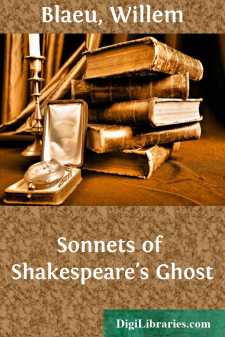Categories
- Antiques & Collectibles 13
- Architecture 36
- Art 48
- Bibles 22
- Biography & Autobiography 813
- Body, Mind & Spirit 142
- Business & Economics 28
- Children's Books 17
- Children's Fiction 14
- Computers 4
- Cooking 94
- Crafts & Hobbies 4
- Drama 346
- Education 46
- Family & Relationships 57
- Fiction 11829
- Games 19
- Gardening 17
- Health & Fitness 34
- History 1377
- House & Home 1
- Humor 147
- Juvenile Fiction 1873
- Juvenile Nonfiction 202
- Language Arts & Disciplines 88
- Law 16
- Literary Collections 686
- Literary Criticism 179
- Mathematics 13
- Medical 41
- Music 40
- Nature 179
- Non-Classifiable 1768
- Performing Arts 7
- Periodicals 1453
- Philosophy 64
- Photography 2
- Poetry 896
- Political Science 203
- Psychology 42
- Reference 154
- Religion 513
- Science 126
- Self-Help 84
- Social Science 81
- Sports & Recreation 34
- Study Aids 3
- Technology & Engineering 59
- Transportation 23
- Travel 463
- True Crime 29
Sonnets of Shakespeare's Ghost
by: Willem Blaeu
Description:
Excerpt
The Spirit of William Shakespeare,
sore vexed of them who say that in his
Sonnets he writ not from the truth of
his heart but from the toyings of his
brain, and that he devised but a feigned
object to fit a feigned affection, herein
maketh answer, renewing as best a
shadow may that rhyme wherein he
was more excellent in the
living body
I
THE wise world saith I not unlock’d my heart
When I of thee and thy dear love did write,
And would each word of mine to false convert,
Doing my simple sense a double spite.
It saith thou wert but shadow born of nought,
But vain creation of an apish rhyme,
While, Fashion’s fool, my strain’d invention sought
To better them who best did please the time.
But wherefore say they so, and do dear wrong
To thee, whose worth was my sole argument,
To me, whose verse ’twas truth alone made strong
By that the breast must feel, not brain invent?
They who this doubt never such beauty knew,
Nor what to poet love alone can do.
THEY say a man ne’er bore such love to man,
Or, if he did, ’twere but a cause for shame;
But, speaking so, they their own measure scan,
And blot their censure with self-blaming blame.
For, thou being Beauty’s best, the best of me
Worshipp’d but Beauty’s self and Beauty’s worth;
My fire and air, my spirit, adorèd thee
Unmix’d with gross compounding of my earth.
And thou wert best of Truth, the first in grace
Of all rich gems in Virtue’s carcanet;
Then should I not love thee and give thee place
Above all love of sense on woman set?
In love of Beauty, whate’er shape ’tis in,
There’s nought of Truth, if it must think of sin.
III
LOOK, when the rose to deep vermilion hue
Adds that sweet odour gracious Nature gives,
When his proud glory gladdens every view,
And no base worm within his beauties lives,
We nothing question of what sex it be,
Nor ask more of it than that it should lend
His lovely gaze for ravish’d eye to see,
And on the blessed air his fragrance spend.
We ask not that the star which lights the heaven
Should be or male or female to our sense,
Suffic’d in this, that it empearls the even,
And happies all our under reverence.
Then might’st not thou, who wert both rose and star,
Be pure to me as these to others are?
SOME hold it strange that love like thine and mine
’Twixt two in state so sunder’d should be bred,
That he who did all worths in him combine,
Birth, beauty, wit, wealth, me thus honourèd,
Me, the poor motley, maim’d by Fortune’s spite,
Sear’d and o’erworn with tyranny of time,
Whose wit was but the wit to learn to write
When thou, my Muse, inspir’dst my pupil rhyme.
Thou wert the wide world’s pride, but I his scorn;
His pattern thou, I his poor toy and tool;
Whence therefore should that tender love be born
’Twixt Fortune’s minion thee, and me her fool?
O know they not that all such outward things
Hold lowest count in the soul’s reckonings?
V
HADST thou been such as, boasting of their birth,
Pass by the humbler-born with proud disdain,
Making self-merit of the antique worth
Whereby some sire that state for them did gain;
Had riches’ dross so reign’d in thy respect,
That riches’ lack were deem’d by thee disgrace;
Of thy rare parts had ’t been the rude effect,
That cruel pride held gentle pity’s place;
Then would’st thou ne’er have look’d on lowly me,
To find what merit there thou might’st approve,
Nor would my heart, grown warm for haughty thee,
Dare or desire to clamour for thy love....


